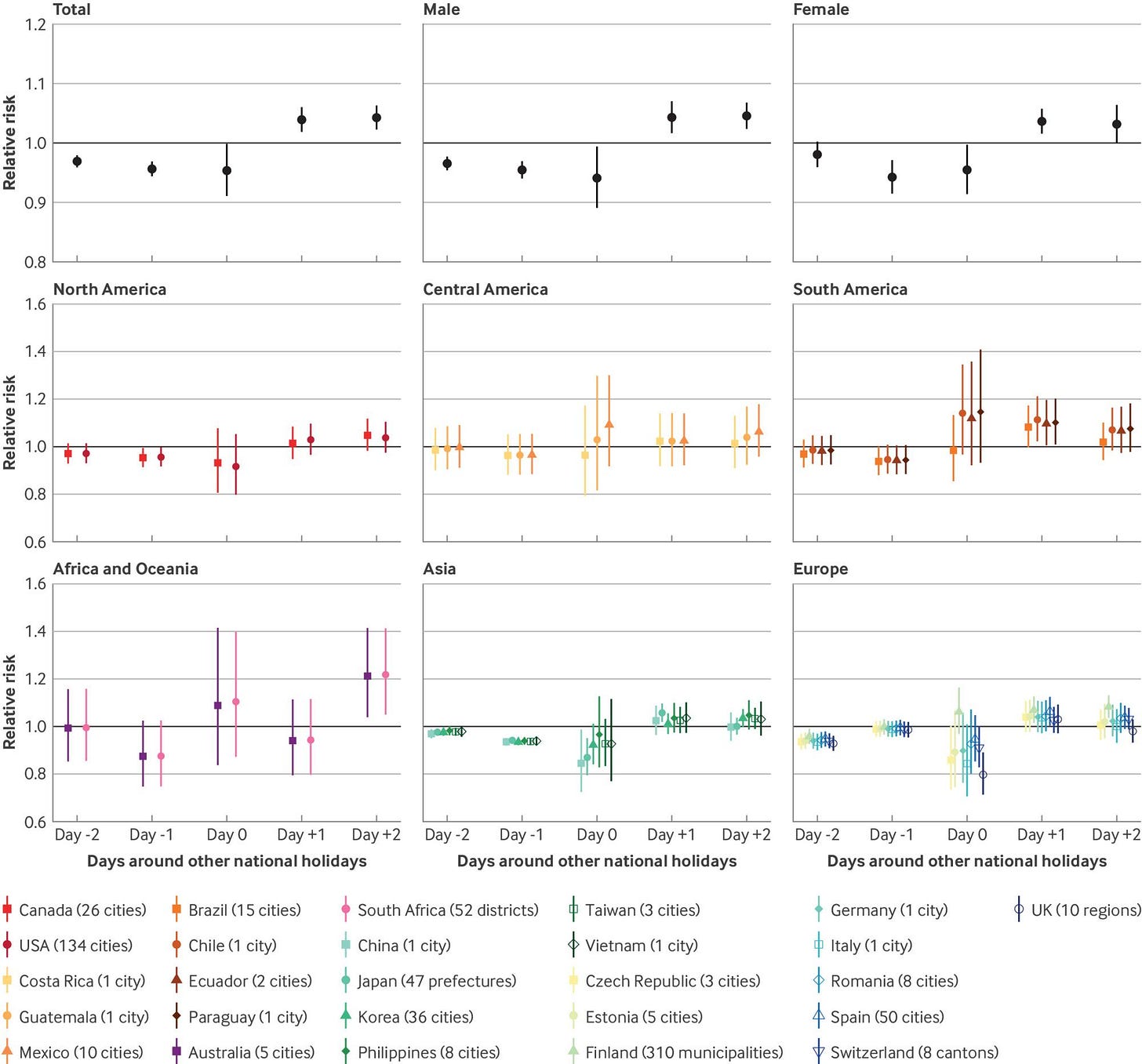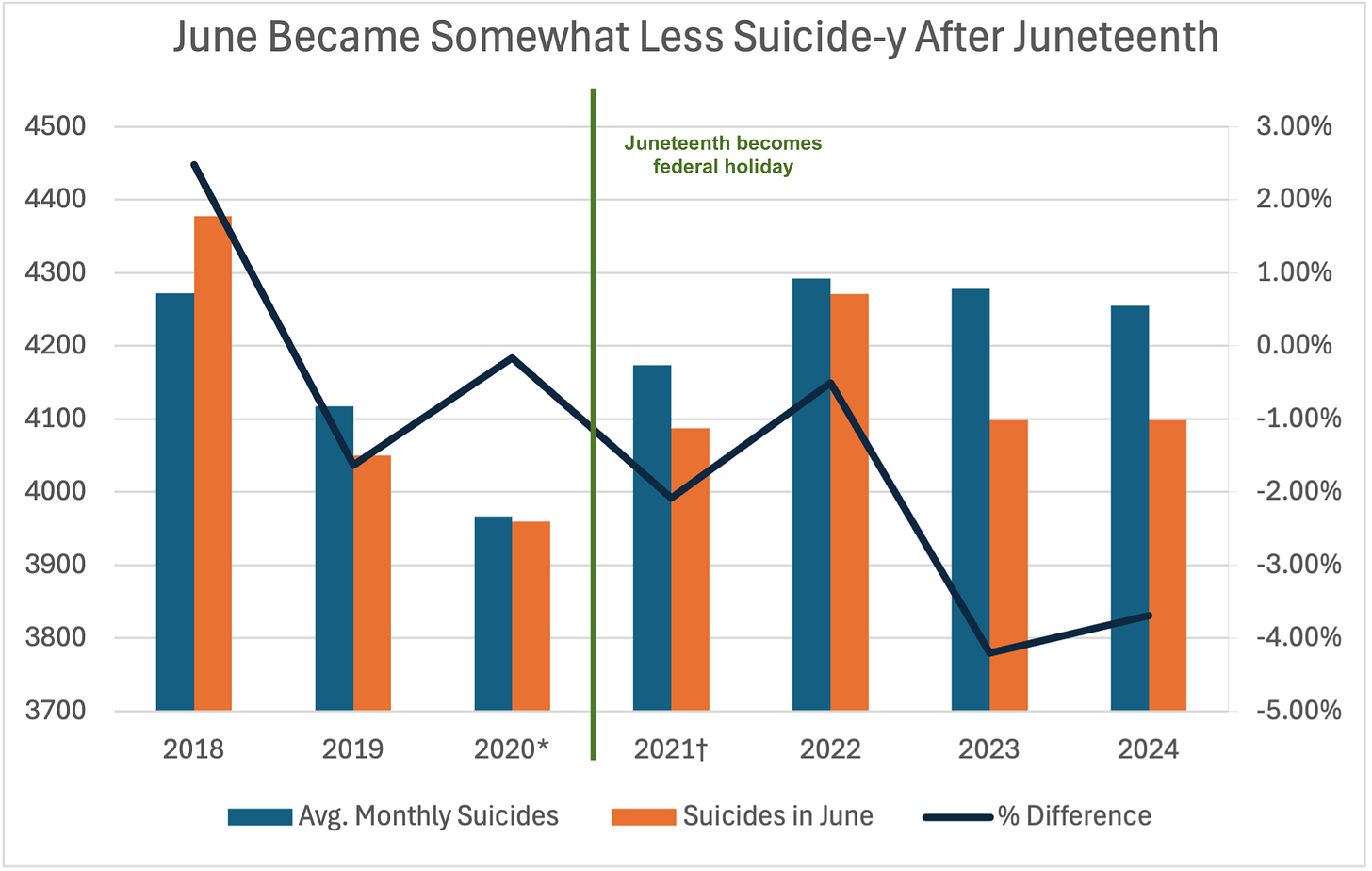1. A New Holiday
In 2021, after decades of activism and several failed legislative efforts, Joe Biden signed the federal observation of Juneteenth into law.
The holiday commemorates June 19, 1865, the date when Texan slaves were finally freed. Which is a pretty great thing to celebrate! Just on its symbolic merits, Juneteenth is a very good holiday—everyone should go out to a park or see family or attend their local All White Empowerment Event.
But what about something like Columbus Day? Its namesake has come under intense recent scrutiny for his… extremely nasty behavior—so should we, as many progressives have suggested, quit celebrating the man? And seeing as alternatives like Indigenous Peoples’ Day just incense the other half of the country, would it be best to simply do away with Columbus Day?
For that matter, what on Earth is Presidents’ Day supposed to be? Its official federal name is Washington’s Birthday, but George Washington was born on February 22, and Presidents’ Day ranges from the 15th to the 21st now. California’s given up the charade, and literally just calls it “The third Monday in February” at the state level. It’s a meaningless day off! What’s it doing in this nation, built off the back of the Protestant Work Ethic?
Clearly, we need some sort of strict threshold for agreeable-commemorative-goodness when it comes to federal holidays. The best and happiest and most unifying moments in our history should be celebrated, but the rest of the year, we should really just keep our nose to the grindstone. Holidays have become like a cancer—we have a duty to contain and excise this tumor of laziness and division before it metastasizes throughout society.
Right?
…
Wrong!
2. Federal Holidays Are Generally Good
It turns out that holidays—even the silliest, most-culture-war-y ones—tend to do good things for our society.
One notable effect, which has been observed since the late 1970s, is “A Drop in Suicides around Major National Holidays.”
Correcting for the effects of extraneous variables, such as seasons and days of the week, we found that suicides dropped by an annual average of −102.5 in the period surrounding the holidays.
This phenomenon isn’t unique to the US—in Hungary, a somewhat weaker effect appears: during religious holidays like Christmas and Easter, there is “no change in suicidal behavior in women, and a decrease in men.”
But in most other countries, a post-holiday spike wipes out the pre-holiday dip in suicides1—it’s really only in the US (and sort of in Canada, the UK, and China too) where they’re an obvious net good:2

This basically makes sense to me: the American civil religion is a good one with many adherents, and so we should expect its holidays to leave people with a somewhat-warmer glow than those of dysfunctional states like Mexico and South Africa.
And it gets better! Holidays are plausibly quite good for the economy—one reason, maybe the most obvious, is that they boost consumption like crazy. Henry Ford had a good sense of this effect back in 1926, when he introduced the five-day work week:3
The people with a five day week will consume more goods than the people with a six day week. People who have more leisure must have more clothes. They must have a greater variety of food. They must have more transportation facilities. They naturally must have more service of various kinds.
This increased consumption will require greater production than we now have. Instead of business being slowed up because the people are 'off work,' it will be speeded up, because the people consume more in their leisure than in their working time. This will lead to more work. And this to more profits. And this to more wages. The result of more leisure will be the exact opposite of what most people might suppose it to be.
Empirical research seems to confirm this idea when it comes to holidays. In “The Impact of National Holidays on Economic Activity: Evidence From Italy,”4 the excellently-named Francesco Maria Esposito finds “that national holidays have a small but positive impact on economic activities or at least no effect on it.” He comments that firms “can adjust their production level between days” in order to mitigate losses during closures, that “workers, during the day after an holiday, are more productive and efficient because they are rested and relaxed,” and that increased “tourism activity … can have a positive impact on the general level of production.”
There’s really only one (minor) economic downside to the national holiday: stock exchanges close down. I don’t really know why this still happens at all—it’s the 21st century, obviously the markets should be open 24/7/365! But, as is, a full day of closure is certainly an unnecessary inefficiency, albeit not a hugely important one.
Another long-known economic effect, about as consistently recorded as the drop in suicide rates, is the observation of “abnormally high returns on the trading day before holidays.” Economists think this is likely an artifact of flawed psychology (though structural explanations exist too); it seems to have persisted into the algorithmic-trading era somehow, but probably represents nothing more than another small, inconsequential inefficiency.
All told, federal holidays are generally great for America! We kill ourselves less, travel more, and buy lots of things—it’s really very beautiful.
3. New Holidays Continue To Be Good
We have some reason to think positive holiday effects will persist at the margin too.
Juneteenth got its start in 2021—I couldn’t find data more granular than month-by-month, but it appears that June’s become somewhat less suicide-y relative to other months in recent years:

And there’s little reason to think that the economic benefits of holiday-addition will disappear.
In “Public holidays, tourism, and economic growth,” Chilean economists Franco Barrera and Nicolás Garrido attempt to build an econometric model that compares the benefits of increased tourism during holidays with the costs of fewer worker-hours. They hypothesize (reasonably) that an inverted-U relationship exists between productivity gains and the number of non-working holidays, though make no attempt to calculate an optimal holiday-number.
Since I have less than zero knowledge about econometrics, I’m breaking down my implicit firewall and asking ChatGPT for help (Claude refused because I don’t pay him; o4-mini obliged for free). You can read our full (short) conversation here, but the headline is, after some finagling:
Model‐consistent optimum ≈ 18 work-day holidays per year.
That’s still well above the current U.S. count of 10 (OECD average ~11).
I think this is probably an overestimate—no one’s flying home to see their family 18 times a year; you’re gonna hit diminishing returns on travel spending sometime well before then!—but it’s still plenty of reason to add at least a few more holidays.
4. Which New Holidays Should We Declare?
Even though just about any holiday would probably do, there are a few obvious rules of thumb to keep in mind for maximizing the good: the best new holidays will be…
not too close to other holidays, neither in timing nor theme;
wholesome and depolarizing;
positive and celebratory; and
economically stimulating.
So how do some candidates stack up?
Wikipedia has a list of nine proposed holidays; unfortunately, they nearly all suck.
Susan B. Anthony Day fails criterion (1) about as hard as possible—similarly, Flag Day is too close to Juneteenth, and 9/11 (which also fails [3]) and Native Americans’ Day come right after Labor Day.
Harriet Tubman Day is a good idea, but pretty thematically similar to Juneteenth; Malcolm X Day is basically “MLK Day but way more controversial.” Election Day is boring, and Rosa Parks Day is “MLK Day but right after Thanksgiving.”
So Cesar Chavez Day it is, then! It’s a good idea, even if not such a profitable one: it explicitly recognizes the contributions of a growing American demographic, and celebrates a man widely considered a great Civil Rights hero.5
But why stick only to what’s already been proposed? We still have no federal holidays in April, nor any in August—so allow me to offer one for each:
International Cheese Day falls on March 27, but US National Cheese Day is celebrated on June 4. Neither has any sort of official sanction, so I feel comfortable proposing that we split the difference: Federal Cheese Day will be celebrated on the last Monday of April each year.
FCD checks every box! You’ve got plenty of time after Cesar Chavez Day to prepare, and around three weeks to digest before Juneteenth; everyone likes cheese, cheese is great, and buying cheese causes money to be spent on cheese.
Now, I know what you’re thinking: Cheese? Really? Isn’t dairy farming very horrifically bad for animal welfare?
Well, as it turns out, dairy is pretty much the least horrifically bad animal product out there! Beef causes around 20 times more suffering per kilogram, chicken 40 times, and farmed salmon more than 100 times. A well-designed Federal Cheese Day could encourage consumers to opt for dairy over poultry or fish, and could even shed light on some of the cruelties of dairy-farming, leading to real systemic change. Done right, it’s a clear win!
Alright, so we’ve got Cesar Chavez in March and Federal Cheese in April—August is all that’s left; ideally early August.
In 2008, early August was mostly occupied by the Beijing Summer Olympics. They started on August 8, actually—08/08/08. And at those Olympics, an American swimmer named Michael Phelps did very well. Better than anyone else ever, in fact! He won an incredible 8 gold medals; finishing first in every event he entered and setting seven new world records.
Phelps is a remarkably good symbol of modern American triumph over adversity. He’s a child of divorce with ADHD and multiple DUIs—still, he found a way to perform at the absolute top of his field. Michael Phelps is a true 21st-century American hero.
So, to commemorate his accomplishment, I propose August 8th be recognized as Swimming Away From Your Problems Day. Before the end of summer, our generally obese, alcoholic, mentally-challenged population should be encouraged to jump in the water and get some exercise. SAFYP Day will help Americans celebrate a national hero, and overcome the worst versions of ourselves. It’ll incentivize us to be physically active, and to buy lots of swimsuits. Again: checks every box.
So, to recap, I’m suggesting:
Cesar Chavez Day on the last Monday in March.
Federal Cheese Day on the last Monday in April.
Swimming Away From Your Problems Day on August 8.
If our government truly cares about suicide prevention and economic stimulus, I expect them to pass each of these federal holidays into law before the year 2030.
It’s past time for our elected representatives to do what’s right. The clock is ticking.

Howard Gabennesch’s “Failed Promise” explanation is accepted as canon in this field of research: suicidal people expect the holiday to make them feel better, so postpone their attempt in expectation. But then the holiday turns out to be normal, they get extra depressed, and suicides rise in the days after.
This beautiful plot comes from a fairly recent study in the British Medical Journal of 1.7 million suicides in 26 different countries.
Some of the economic literature on Henry Ford’s labor practices is pretty fascinating. Check out:
Why Italy? Because no real work exists on this in the United States!
Why does no real work exist on this in the United States? Because, as the author of the Italy paper points out, the American holiday scheme is super convoluted by global standards: heterogeneity between state and local observance alone is enough to overcomplicate any empirical effort.
I’d be remiss not to point out that Chavez eventually became a crazy person who drove his union, the United Farm Workers, into the ground. In the late 70s, instead of collecting dues from members, Chavez insisted on taking funding from and growing closer to Synanon, a Californian cult with ties to child abuse, terrorism, and murder. When the UFW started to go down, Chavez was quick to blame his Jew lawyers. Not, altogether, a great dude! But his legend lives on, so…







I feel like this is almost an argument for the 4-day workweek. I just had this discussion with a friend—if we can’t get to 3 day weekends directly, maybe we can just spam federal holidays until we functionally have 3 day weekends anyways? Food for thought.
Holidays are used to try and promote a national / religious culture. Giving any ground in this area to abolitionists / pro-black culture is a bad idea. The more you give them, the more they ask for, and the uglier they become.